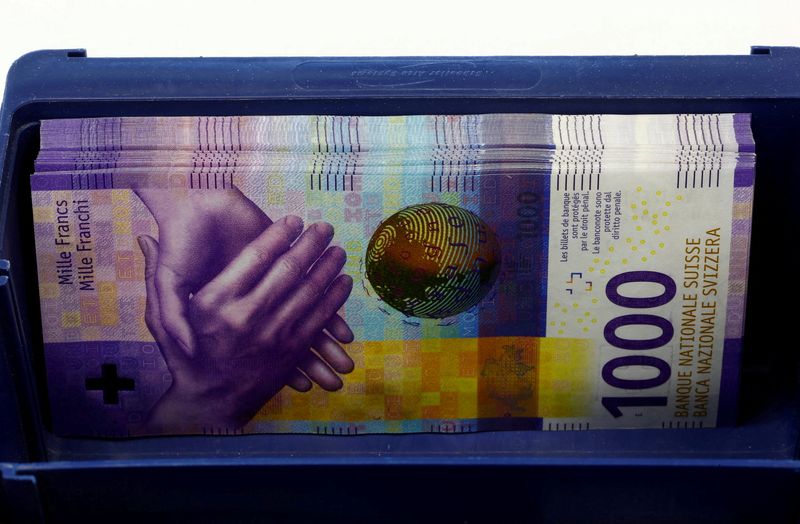By Samuel Indyk
LONDON (Reuters) -The Swiss franc hasn't lived up to its safe-haven reputation during the Credit Suisse collapse, as investors have sought shelter elsewhere, bringing more of a boost to the value of the gold in Switzerland's bullion vaults than to its currency.
Money managers ditched the Swiss franc at the fastest rate in two years last week in the run-up to the dramatic takeover of Credit Suisse by UBS.
The Swissie, often used as a refuge in times of market stress or volatility, lost 0.9% against the dollar in the week after the Swiss finance department said regulators were closely monitoring the situation at Credit Suisse on March 13.
In that same time, Japan's yen, which is also seen as a refuge in times of tumult, rose 2.6% against the dollar. Since troubles emerged at Silicon Valley Bank on March 9, the yen has gained over 5.5% against the dollar.
Gold, another traditional safe haven, rose over 5% in the week after March 13 to above $2,000 an ounce, its highest in over a year, while government bonds saw some of their biggest inflows in decades.
"It definitely is to do with developments in the banking sector," said Kirstine Kundby-Nielsen, FX analyst at Danske Bank, on why the franc wasn't stronger.
"You still have some of the safe-haven hedging properties in the Swiss franc but it can only take so much when the risk ends up being so concentrated in the Swiss economy and the Swiss financial sector," Kundby-Nielsen added.
Speculators added over $800 million to their bearish positions on the Swiss franc in the week to March 21, according to data from the Commodities Futures Trading Commission, the most in one week since early March 2021.
On Sunday, the Swiss National Bank (SNB) orchestrated a $3 billion deal for UBS to buy rival Credit Suisse, backed by a massive guarantee of up to $260 billion, a third of the country's national output, in state and central bank support.
"If it hadn't been Credit Suisse, but any other European bank getting into trouble, you would have seen the Swiss franc rising sharply because it would have been the safe haven for European risk," said Francesco Pesole, FX strategist at ING.
Research from the SNB in 2016 found that in previous crises, flows into Switzerland and the franc were driven by weaknesses elsewhere.
Futures data shows speculators poured money into bullish bets on the Swissie after the dot-com bubble burst in early 2000, after the 9/11 attacks in 2001, and again in 2008 and 2011-2012, during the euro zone debt crisis and once more during the COVID crisis.
During the collapse of Lehman Brothers in 2008, net inflows were driven by a "substantial retrenchment" into the domestic market by Swiss banks, while in the euro area banking crisis from mid-2011, the SNB found that moves away from the euro and into the franc were driven by foreign banks moving assets from the euro area branches into their Swiss branches.
"The current setup doesn't argue for either of those things. U.S. bank stresses have been contained in regional banks and euro area banks have so far been relatively unscathed," said Michael Cahill, senior FX strategist at Goldman Sachs (NYSE:GS).
"The franc is not an 'all-weather' safe haven and so far we've not had the type of market pressures that would typically lead to franc appreciation," he said.
Switzerland's long history of political neutrality but active integration into the global economy also helps the country provide a shelter during times of heightened geopolitical tensions.
This trend was observed in February last year when the franc gained 5% against the euro in the two weeks after Russia invaded Ukraine.
SWISS FRANC STILL A HAVEN
It's one thing for the franc to have lost some favour among investors during a Swiss-centric crisis, but quite another to suggest its days as a safe haven are numbered.
For the Swiss franc to lose its status as a safe haven, FX strategists at Barclays (LON:BARC) say "fundamental changes" in the country's balance sheet would be required, with the share of Swiss-issued assets in external liabilities required to fall via "large and sustained" outflows.
"This would lead to an increase in domestic interest rates, thereby increasing the yield Switzerland's external liabilities pay and further weighing on the country's yield differential," Barclays FX strategists, led by Lefteris Farmakis, said.
"In such a scenario, the SNB would likely attempt to smooth out the transition by cushioning capital outflows," Farmakis said.

Barclays said the odds of a "sudden stop" episode are extremely low despite the current banking turmoil, but a more difficult question to answer is whether confidence in the financial system has been eroded to a degree that a "slow burn" episode may have started.
"Fortunately," Barclays says, "this scenario has limited repercussions for the franc over the foreseeable future."